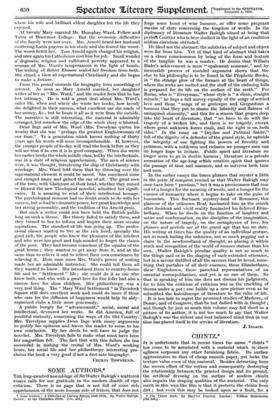SOME AUTHORS.* Tim long-awaited assemblage of Sir Walter Raleigh's scattered
essays calls for our gratitude in the modern dearth of ripe criticism. There is no page that is not full of some rich apprehension of the more human side of letters, that does not • Some Authors : A Collection of TAterary Essays, 1896-1916, By Walter Raleigh. Oxford: at the aarendon Preto. [15s. net.]
forge some bond of wise humour, or offer some pregnant maxim of state concerning the kingdom of words. In the diplomacy of literature Walter Raleigh aimed at being that perfect Courtier who is here studied in the light of an erudition seldom elsewhere obtruded.
He liked not the abstract, the subtleties of subject and object were far from him. Yet of that kind of abstract that takes on a closer consciousness by being of the form and texture of the tangible he was a master. He denies that William Blake's achievement is mere "opalescent nonsense," and by inexorable process of rounded argument shows that the clue to his philosophy, is to be found, in the Prophetic Books, in "the strange glow of the furnace at the heart of things, where the rocks are melted and the stuff of the enduring hills is prepared for its life on the surface of the earth." For Burns, who is "Everyman," whose style is "a clean, straight miracle," he begs a full survey equally of the songs of settled love and those "songs of so grotesque and Gargantuan a humour that they put to shame the lubricity and flatness of uninspired obscenity," and this for a reason that gropes deep into the heart of literature, that "we have to do with the tragedy of a broken life, and there is no tragedy, except where great unknown forces clash, and the right is on both sides." In the essay on "Dryden and Political Satire," full of the dignity of a defender of the grand style, he upholds the integrity of one fighting the powers of frivolity and pettiness, with a nobleness and richness we younger men can no longer hope to imitate. Public spirit and literature no longer seem to go in double harness ; literature is a private recreation of the age-long selfish creative spirit that ignores the passage of time and manners, and so survives both time and men.
In the earlier essays the brave phrases that royster a little in the pride of conquest remind us that Walter Raleigh may once have been "precious," but it was a preciousness that rose out of a hunger for the meaning of words, and a hunger for the essence of humanity where it begins to take on the guise of humanism. This fluctuant mystery-land of Romance, this glamour of the unknown Real, fascinated him as the search after insistent and vivid reality fascinated his beloved Eliza- bethans. When he dwells on the function of laughter and satire and condemnation, on the discipline of the imagination, on the nature of tragedy, on the metaphysics of love, his phrases and periods are of the grand age that has no date. His writing at times has the quality of an individual gesture, not so much hailing the unknown, not so much pegging out a claim in the newfoundland of thought, as placing it within reach and recognition of the world of meaner stature than his own. Walter Raleigh's peculiar quality is not so much in the things said or in the shaping of each extended utterance, but in a savour distilled of all the savours that he loved, some- thing that partakes of all their essences, these Elizabethans, these Englishmen, these parochial representatives of an essential cosmopolitanism, and yet is no one of them. So that in speaking of him one does not discuss his judgments, for to him the criticism of criticism was as the crackling of thorns under a pot ; one builds up a new picture even as he submitted the kaleidoscope of literature to the rules of life.
It is too late to regret the promised studies of Marlowe, of Donne, and of Congreve, that he but dallied with in thought ; and though by just so much this volume may fall short as a picture of its author, it is not too much to say that Walter Raleigh's was the richest and best balanced mind that in our time has placed itself in the service of literature.
J. lseAcs.


























































 Previous page
Previous page